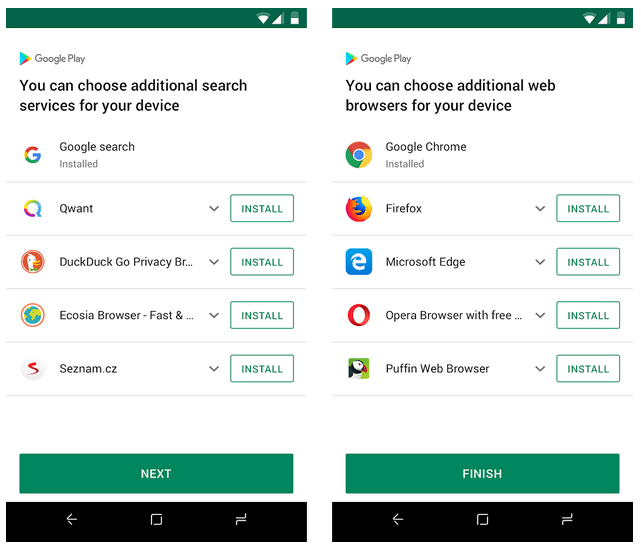Google to offer browser, search-app choices in Android Europe set-up flow
Users will be asked to choose from among five search and browser apps in randomized order.
In a European antitrust decision last year, Google was ordered stop compelling phone makers to pre-install Google apps to gain access to Google Play. The decision came with a €4.3 billion (roughly $5 billion) fine, which Google is appealing.
New search, browser set-up. Despite the appeal, Google is complying with the decision. As part of that process, Google has created a new set-up flow for Android users that requires them to install search and browser apps. This is reminiscent of what Microsoft had to do years ago (2009) in Europe on the desktop, when it was required to offer “browser choice.”
In its blog post, Google previews what the new search and browser selection screens will look like.
These screens will appear “the first time a user opens Google Play after receiving an upcoming update.” Google explains each screen will have a total of five search and browser choices, including any apps that may already be installed.
The top five will appear. Google says, “Apps that are not already installed on the device will be included based on their popularity and shown in a random order.” In other words, the most popular apps will be the default selections but they will be ranked in a randomized order. Google will also prompt users after they download any non-Google search apps about whether they want to change Chrome’s default search engine (from Google).
Users will be able to install multiple apps in each category. The company said this will roll out in the coming weeks (but the implementation may evolve) and will extend to existing Android phones in Europe.
Why we should care. Google’s various competitors in Europe complained that the pre-installed privilege of various Google apps (i.e., search, Chome, Maps, YouTube) put them at a competitive disadvantage. This new set-up process will test that thesis and expose European smartphone users to additional choices.
It will likely drive an uptick in downloads and usage for some of these alternative apps. (Now is the time for them to be aggressively marketing themselves.) However, it is likely that Chrome and Google will continue to overwhelmingly dominate browser and search downloads. Many marketers should expect that Google’s paid search and other ad revenues in Europe will not be impacted by these changes.
Contributing authors are invited to create content for Search Engine Land and are chosen for their expertise and contribution to the search community. Our contributors work under the oversight of the editorial staff and contributions are checked for quality and relevance to our readers. The opinions they express are their own.
Related stories
